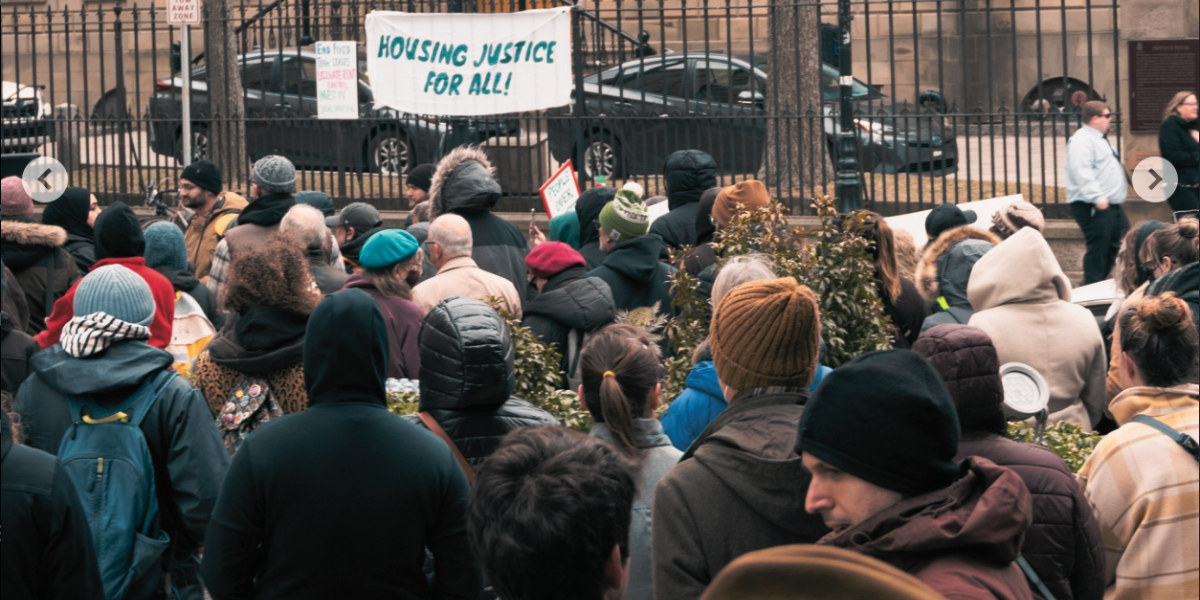You don’t have to look too deep to find evidence of Nova Scotia’s housing crisis. Every day there are stories from tenants, housing organizations, shelters, and workers about how hard it is to find housing in Nova Scotia.
Already in May, a legal service drop in for tenants has had to pause new intakes to deal with a backlog of residential tenancy cases and housing advocates report tenants are waiting months to be approved for rental subsidies as demand balloons. There is even a Halifax area hotel that will be closing as it converts to an emergency shelter for over 100 people.
But despite the crisis worsening, all that is on offer from the Houston government is luxury condos and a rental cap with a loophole so large that it essentially renders the cap useless.
Tim Houston forgets landlords want higher profits
On March 22, the Conservatives finally announced an extension to the temporary rent cap that has been in place since 2020. Originally introduced as a pandemic program, Nova Scotia’s rent cap was a big win for tenants and neither Liberal nor Conservative governments have been able to cancel it due to ongoing pressure from tenants and workers.
Unsurprisingly, the Houston government fell in line with landlords and developers and increased allowable rent increases from 2 per cent per year to 5 per cent per year. What is worse, though, is that they refused to close the gaping loophole offered by fixed-term leases.
Unlike a regular lease, fixed-term leases have a defined end date. When the lease is up, an entirely new lease can be negotiated. This allows landlords to charge whatever they want when offering a new lease when the term expires. It also prevents tenants from accessing security of tenure in their apartments, even if they live there for several years, and does not require landlords to provide the same kinds of notices for rental increases and evictions.
Since the rent cap was introduced, landlords have been skirting the 2 per cent limit on rental increases by using fixed term leases. The Conservatives call this a “misuse” of fixed term leases, but it’s actually perfectly legal under the scheme they created.
Instead of closing the loophole by tying the cap to the unit and not the tenant, as has been recommended by housing organizations, the Houston government has said that they hope allowing landlords to increase rent my more will stop them from using fixed-term leases.
“I acknowledge that there are on occasion landlords who use fixed-term leases for unintended purposes…I think that has been compounded by the 2 per cent rent cap that has existed since the former government,” said Conservative Minister Colton Leblanc. “I am hopeful that the increase that we have proposed today in legislation will provide some relief to landlords, but also [protect] tenants in our province.”
But as housing advocates explained to a government committee about the legislation, landlords are focused on maximizing their investments, not on providing housing.
Tenants aren’t holding their breath that benevolent landlords will solve the housing crisis.
The Houston government also once again failed to make the rent cap permanent, meaning tenants must continue to fight for permanent rent control.
Trickle down apartment strategy continues
Beyond the extension of the rent cap, the Houston government also doubled down this spring on its refusal to invest in new public housing with exactly $0 for new units in the 2023-2024 budget.
Everyone agrees that Nova Scotia needs more housing. But while community organizations, shelters, women’s organizations, progressive think tanks, and student groups, have all called for more investments in non-market housing (including public housing, co-ops, and non-profit housing), the Houston government believes that if we build more lakeside subdivisions and luxury condos, the benefits will trickle down to low-income tenants.
In contrast to their nil investment in new public housing units, the Conservatives have fast-tracked about 23,000 new housing units being built by developers. Not one of those new units is designated as affordable housing.
Tim Houston isn’t shy about this strategy. He explained the government’s trickle-down apartment theory in the legislature during a 2021 exchange with then NDP Leader Gary Burrill.
“We need supply at all levels. A $2,000-a-month apartment can be moved into by somebody who may vacate an apartment that’s more affordable for somebody else,” said Houston. “For [Burrill] to suggest that there is only supply that’s needed at one level just shows [he] really doesn’t understand the issue.”
The idea that people moving to more expensive apartments leave behind an affordable apartment for the next person is absurd. Without rent control tied to the unit (not to the tenant), landlords are free to increase rent to whatever they want when a tenant moves out. And, with Halifax’s historically low vacancy rate, what landlords can charge is going up and up. The market can’t fix the housing crisis.
Not surprisingly, it is tenants and community organizations that are actually doing the work to maintain and expand affordable housing. It is the tenants organizing and fighting back to stay in their homes as landlords attempt to displace them and the organizations opening new affordable housing communities who are doing the real heavy lifting to help make sure people have homes.
$21 million more in subsidies for landlords
Despite refusing to invest in new public housing units, the Houston government seems to have no problem giving plenty of cash to landlords. With so little supply of public, co-op and non-profit housing, the government provides rental subsidies to help tenants afford private rentals. While a small portion of rent subsidies apply to units in co-ops or non-profit housing, these subsidies are largely a direct transfer of money from the public to the hands of private landlords.
As the housing crisis has intensified, Liberal and Conservative governments have pumped more money into these landlord subsidies.
In 2023-24, the Houston government will pay $21 million more to landlords through 1000 new rent subsidies. In total, 8000 tenants will receive rent subsidies.
Funnelling huge amounts of money into the pockets of landlords does nothing to improve the long-term stability of housing for tenants. Rent subsidies are an annual expense for the government, meanwhile tenants still face housing instability in the event that the building is sold or they are unable to afford their rent, even with the subsidy.
Instead, the government could be spending money to build more housing. Ten years ago, this looked to be the direction that government housing investments were going. In 2012, the former NDP government was set to buy a former school in North End Halifax to convert into housing and commercial space. Instead, the Liberals killed the deal, the city sold the land to a private developer, and, 10 years later, the lot sits unchanged.
Tenants fight back
As the housing crisis has gotten worse, more and more tenants are seeing that the only way they can ensure that they have access to a place to live is to fight to keep the housing they have.
Housing organizations are overwhelmed because tenants are not accepting eviction notices and illegal renovictions.
People working directly with unhoused people and people living in poverty are organizing through a new group, recognizing that service delivery alone will not solve the problems faced by the people they work with.
ACORN members recently won landlord licensing.
Tenants can organize and win in the fight against being displaced by landlords and the Conservative government.
Tim Houston’s belief in benevolent landlords and trickle-down apartments isn’t going to save us from the housing crisis, so workers will need to continue to fight to ensure everyone has a place to live that they can afford.
Did you like this article? Help us produce more like it by donating $1, $2, or $5. Donate


